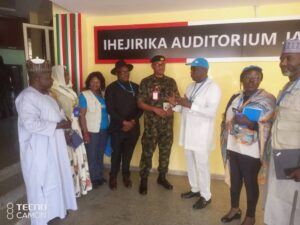UNICEF, on Tuesday, handed over documents to the Armed Forces Command and Staff College (AFCSC), Jaji, and the Nigerian Defence Academy (NDA) on child protection in armed conflict.
By Sani Idris
UNICEF, on Tuesday, handed over documents to the Armed Forces Command and Staff College (AFCSC), Jaji, and the Nigerian Defence Academy (NDA) on child protection in armed conflict.
The documents include an implementation plan for the handover protocol for children encountered during armed conflict in Nigeria and the Lake Chad Basin region.
During presentations at both institutions, Ibrahim Sesay, UNICEF Nigeria’s Chief of Child Protection, addressed issues of child protection under international human rights and humanitarian law.
Sesay also highlighted UNICEF’s partnership with the military in implementing the handover protocol signed by the Nigerian government, the UN, and UNICEF on 30th September 2022.
He stressed that the partnership strengthens the military’s capacity to protect children encountered during military operations, particularly in the Northeast.
Sesay explained that the protocol includes seven segments, with a critical focus on children under 18, ensuring that it applies not only to Nigerian children but to those from the entire Lake Chad Basin.
He added that the protocol takes into account the transnational nature of conflict, with children often crossing borders and interacting with security forces.
Sesay commended the Nigerian military for reducing the duration of stay for children in administrative custody, now limited to two to three days instead of weeks.
“The children, including women with children, are then released to a competent civilian authority, typically the Ministry of Women Affairs and Social Development,” he said.
He highlighted the importance of the protocol’s implementation plan, led by the Nigerian Army with the involvement of all relevant stakeholders, ensuring its successful execution.
“I am pleased to announce that implementation has already started in earnest,” he stated, noting that children are treated as victims and their best interests are prioritised.
Rear Adm. Aniefiok Uko, Deputy Commandant of the AFCSC, said the college offers courses on international and humanitarian law for students.
The protocol directly applies to students at the college, who are commanders in the field, teaching them how to handle children in conflict situations.
Uko acknowledged the country’s ongoing conflicts and the need for commanders to understand how to treat children in conflict and the procedures for handing them over to civilian authorities.
The Deputy Commandant confirmed the college’s acceptance of the protocol, as it has been endorsed by the government, and assured its continued integration into military training.
He further assured that the college would include the protocol’s recommendations in its simulation exercises, emphasising its relevance in real-world scenarios.
Uko also stated that the Nigerian Armed Forces would continue to protect children in armed conflicts, as they have done even before the development of the Child Protection Protocol.
The Nigerian Defence Academy (NDA) will also include the protocol in its training curriculum to ensure that all officers are equipped with its provisions.
The News Agency of Nigeria (NAN) reports that UNICEF will also hand over the same documents to the Nigerian Army Training and Doctrine Command (TRADOC). (NAN)




